Related Research Articles

A player piano is a self-playing piano with a pneumatic or electro-mechanical mechanism that operates the piano action using perforated paper or metallic rolls. Modern versions use MIDI. The player piano gained popularity as mass-produced home pianos increased in the late 19th and early 20th centuries. Sales peaked in 1924 and subsequently declined with improvements in electrical phonograph recordings in the mid-1920s. The advent of electrical amplification in home music reproduction, brought by radios, contributed to a decline in popularity, and the stock market crash of 1929 virtually wiped out production.
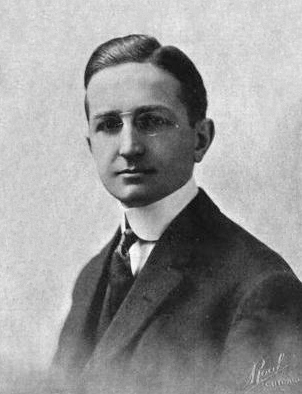
Ernest Martin Skinner was an American pipe organ builder. His electro-pneumatic switching systems advanced the technology of organ building in the first part of the 20th century.
Chickering & Sons was an American piano manufacturer located in Boston, Massachusetts. The company was founded in 1823 by Jonas Chickering and James Stewart, but the partnership dissolved four years later. By 1830 Jonas Chickering became partners with John Mackay, manufacturing pianos as "Chickering & Company", and later "Chickering & Mackays" until the senior Mackay's death in 1841, and reorganized as "Chickering & Sons" in 1853. Chickering pianos continued to be made until 1983.

Mason & Hamlin is an American manufacturer of handcrafted grand and upright pianos, currently based in Haverhill, Massachusetts. Founded in 1854, it is one of two surviving American piano manufacturers from the "Golden Age" of pianos, although some smaller piano manufacturers have since started in the United States.
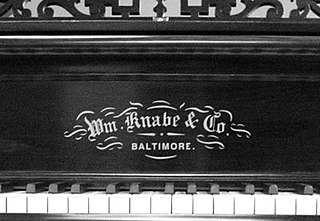
Wm. Knabe & Co. was a piano manufacturing company in Baltimore, Maryland, from the middle of the nineteenth century through the beginning of the 20th century, and continued as a division of Aeolian-American at East Rochester, New York, until 1982. The name is currently used for a line of pianos manufactured by Samick Musical Instruments.

QRS Music Technologies, Inc. is an American company that makes modern player pianos. It was founded as Q•R•S Music Company in 1900 to make piano rolls, the perforated rolls of paper read by player pianos to reproduce music. The company also produced shellac records in the 1920s and 1930s and radios beginning in the 1920s. Today, it makes modern, digital variations on the player piano and the recordings to drive them.
Lindeman was a name used by a series of piano manufacturers in New York in the nineteenth and twentieth centuries. The concern was founded by William Lindeman (1794–1875) on a small scale in Dresden in about 1822, and reestablished by him in New York City in 1835 or 1836, where it grew to a medium size within twenty years. American piano historian Daniel Spillane credited him as one of the first successful immigrant German piano makers in the United States.

The Schiller Piano Company was an American manufacturer of pianos in Oregon, Illinois. It operated independently from 1890 to 1936, when it merged with the Cable Company and thereafter produced pianos under the name Cable and Conover. Thousands of pianos were produced in its factory, which was operated by corporate successors until 1971. The 120,000-square-foot (11,000 m2), stucco-clad building was renovated for use as an indoor mall in 1975 and today operates as the Conover Square Mall.

American Piano Company (Ampico) was an American piano manufacturer formed in 1908 through the merger of Wm. Knabe & Co., Chickering & Sons, Marshall & Wendell, and Foster-Armstrong. They later purchased the Mason & Hamlin piano company as their flagship piano. The merger created one of the largest American piano manufacturers. In 1932, it was merged with the Aeolian Company to form Aeolian-American Co.

The Aeolian Company was a musical-instrument making firm whose products included player organs, pianos, sheet music, records and phonographs. Founded in 1887, it was at one point the world's largest such firm. During the mid 20th century, it surpassed Kimball to become the largest supplier of pianos in the United States, having contracts with Steinway & Sons due to its Duo-Art system of player pianos. It went out of business in 1985.

Steck was a brand of pianos manufactured from 1857 to 1985. They were initially made by George Steck & Company before combining with the Aeolian Company in 1904. The Aeolian Company went bankrupt in 1985. The Steck piano brand was then sold to Sohmer & Co., and then to America Sejung Corporation, which dissolved in 2013.
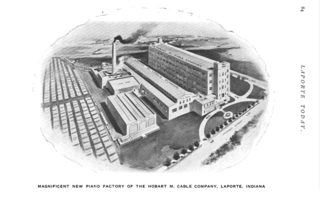
The Hobart M. Cable Co. is a defunct American piano manufacturer that operated from 1900 until the 1960s, mostly in La Porte, Indiana.
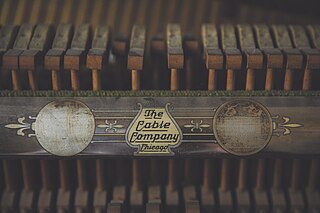
The Cable Company was an American manufacturer and distributor of pianos and reed organs that operated independently from 1880 to 1936.

Edwin Scott Votey was an American businessman, inventor, industrial designer, and manufacturer of pianos and organs. He worked in the organ field all his adult life and had over twenty patents. He invented or co-invented several inventions for World War I. One was a pilotless airplane that was going to be used to drop bombs on the enemy but was never used.
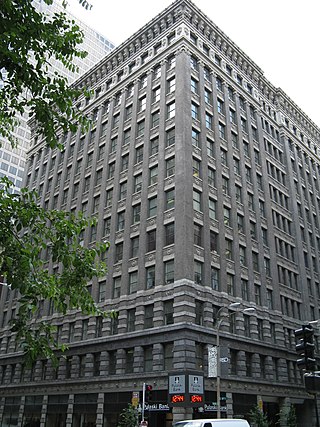
The Frisco Building is a historic office building in downtown St. Louis, Missouri. The building was built in 1903-04 as the headquarters for the St. Louis–San Francisco Railway, which was also known as the Frisco. The architecture firm Eames and Young designed the building as well as its 1905-06 addition; the building's subtle ornamentation and its pier and spandrel system were both important developments in skyscraper design. The Frisco occupied the building for almost eighty years after its opening, and in that time played an important role in Missouri's economic development through railroad construction.
The Weber Piano Company is a former piano manufacturing company based in New York City and East Rochester, New York from the middle of the 19th century through the beginning of the 20th century, and continued as a division of Aeolian-American at East Rochester, New York until 1985, when Aeolian went out of business.

Cavendish Pianos is a brand of pianos made at Yorkshire Pianos, the only company producing pianos still wholly built in the United Kingdom.
The Straube Piano Company (1895–1937) and its successor Straube Pianos Inc. (1937–1949) were American piano manufacturers of uprights, grands, players, and reproducing grands.

Schiedmayer is the name of a German Instrument-manufacturing family. Established in 1735 as a keyboard instrument manufacturer, it is still active today as a family business.
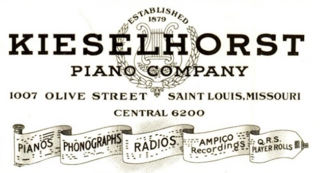
The Kieselhorst Piano Company was an American vendor of pianos and publisher of sheet music that operated from 1879 to 1930 in Saint Louis, Missouri.
References
- 1 2 3 Dolge, Alfred (1913). Pianos and Their Makers: Development of the piano industry in America since the centennial exhibition at Philadelphia, 1896. Covina Publishing Company.
- ↑ "TimesMachine: Friday November 29, 1946 - NYTimes.com". timesmachine.nytimes.com. Retrieved 2022-01-27.
- ↑ "Music Trade Review: MTR-1953-112-1". mtr.arcade-museum.com. Retrieved 2022-01-28.
- ↑ "Music Trade Review: MTR-1952-111-7". mtr.arcade-museum.com. Retrieved 2022-01-28.
- 1 2 "Music Trade Review: MTR-1952-111-7". mtr.arcade-museum.com. Retrieved 2022-01-28.